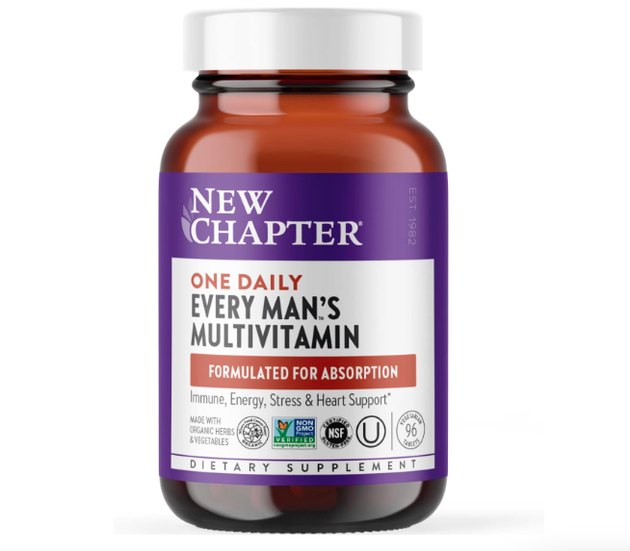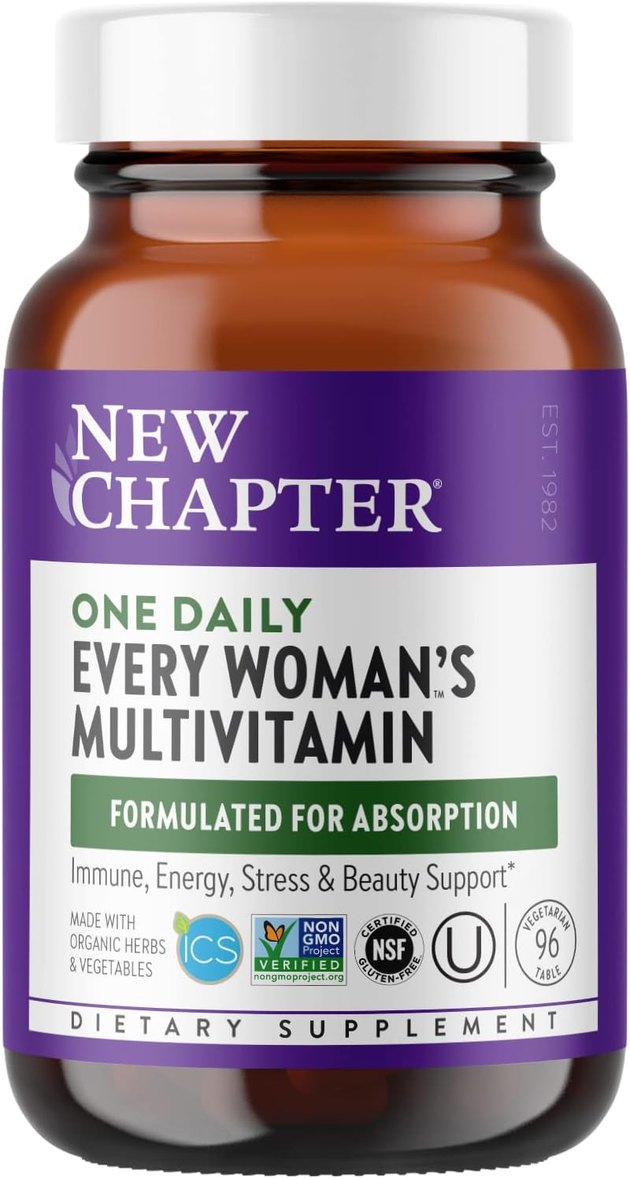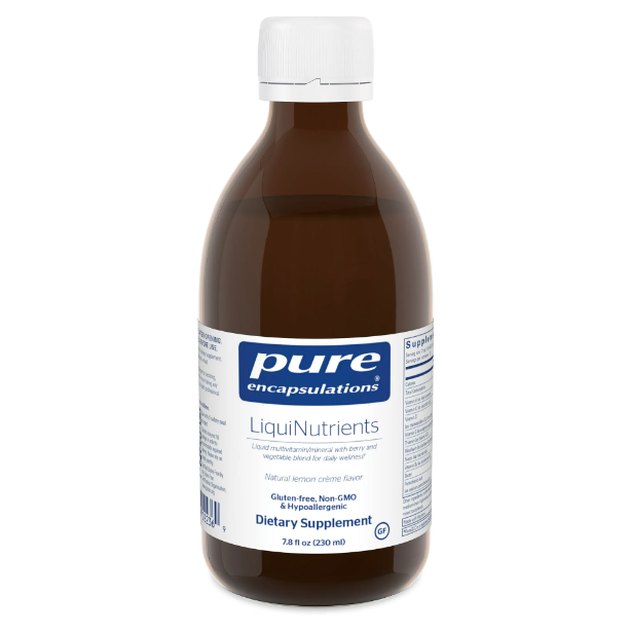
Like their name suggestions, multivitamins contain a multitude of vitamins, minerals and other nutrients. They're designed to help you meet your basic nutritional needs.
But the amount of nutrients in these supplements can vary quite a bit, and there are some people who may want to avoid high amounts of B vitamins. Some people report having side effects from high doses of B vitamins, and in some cases, they can even cause toxicity.
Video of the Day
Video of the Day
There aren't any multivitamins that are completely free of B vitamins, as they're considered a necessary nutrient and you can can only get them from your diet. But if you're on the market for a multi with just the right amount you need, we've got you covered.
Warning
Always talk to your doctor before trying a new supplement. People with vitamin B toxicity should approach multivitamins with caution, as most of these products have B vitamins in them.
Multivitamins to Try
How We Chose
We chose these multivitamins based on input from medical experts and the following criteria:
- Brand and quality of ingredients
- Amount of B vitamins in the supplement
Learn more about how we cover products.
Are There Multivitamins Without B Complex?
Multivitamins tend to be high in the vitamin B complex vitamins, but for some, that isn't ideal. High doses of vitamins B3 (niacin), B6 (pyridoxine), B9 (folate or folic acid) and B12 (cobalamin) can lead to toxicity and an array of uncomfortable symptoms, according to Consumer Lab.
When you're reading the nutrition label on a multivitamin, it's not uncommon to see upwards of 1,000 percent of the daily recommended value (DV) for vitamins like B12.
"This is because B vitamins are water-soluble and in general, harmless in large dosages," says Philip Rabito, MD, an endocrinologist in New York. "The high B vitamin dosage in multivitamins is likely because of the general false premise that 'more is better.'"
Even when it comes to necessary nutrients, getting more than you need may not be necessary: "It is a misconception that giving B vitamins to everyone will improve energy levels and wellbeing," he says. "In reality, there is no health benefit to supplementing B vitamins for those who get enough from their diets."
There are, however, a few multivitamins that forego high doses and have just the right amount to meet your daily needs. Below, we'll share a few options to choose from.
1. New Chapter Every Man's One Daily Multivitamin
This vitamin doesn't have more than your daily need for most vitamins, including those in the B complex group. Each daily tablet gives you:
- Thiamin (B1): 100 percent of your Daily Value (DV)
- Riboflavin (B2): 100 percent DV
- Niacin (B3): 100 percent DV
- Pyridoxine (B6): 100 percent DV
- Folate (B9): 50 percent DV
- Vitamin B12: 200 percent DV
- Biotin (B7): 50 percent DV
- Pantothenic acid (B5): 100 percent DV
If you're looking for a multivitamin without B6 or B12, it's unlikely you'll find one. That said, you wouldn't have to worry about B6 toxicity with this supplement, as it doesn't have more than you need.
New Chapter vitamins are made with whole-food ingredients (that is, real fruits, vegetables and herbs). The brand's products are also USDA Certified Organic and certified as compliant with the FDA's Current Good Manufacturing Practice by the NSF, an organization that ensures supplement quality.
Here at LIVESTRONG.com, we make deliberate choices about the language we use in regards to sex and gender. While the products here are marketed to men and women, we encourage you to speak with your health care team about the best options to suit your unique nutritional needs.
2. New Chapter Every Woman's One Daily Multivitamin
This multivitamin, much like the men's version above, is formulated to meet your basic nutritional needs and doesn't have high amounts of B vitamins in it.
One daily tablet gives you:
- Thiamin (B1): 100 percent DV
- Riboflavin (B2): 100 percent DV
- Niacin (B3): 100 percent DV
- Pyridoxine (B6): 100 percent DV
- Folate (B9): 100 percent DV
- Vitamin B12: 200 percent DV
- Biotin (B7): 50 percent DV
- Pantothenic acid (B5): 100 percent DV
Tip
New Chapter's Multivitamins also contain herbal "support blends" for things like stress, immunity and hormone health. While these are made with natural ingredients, it's important to ask your doctor if they're safe for you, especially if you have certain health conditions or are taking medications.
3. Pure Encapsulations LiquiNutrients
This liquid supplement from Pure Encapsulations is a great multivitamin without B9 or B12.
One of the best parts of taking a liquid multivitamin is you can take smaller doses if you're trying to avoid high amounts of certain vitamins. If you halve the recommended 2-teaspoon dose of this multi and just take 1 teaspoon, you'll get some B vitamins, but not much more than you need in a day.
Again, it's always best to talk to your doctor before deciding on a supplement dosage to ensure it's safe for you.
If you were to take one teaspoon of this liquid multivitamin, you'd get:
- Thiamin (B1): 313 percent DV
- Riboflavin (B2): 154 percent DV
- Niacin (B3): 78 percent DV
- Pyridoxine (B6): 147 percent DV
- Folate (B9): 0 percent DV
- Vitamin B12: 0 percent DV
- Biotin (B7): 667 percent DV
- Pantothenic acid (B5): 250 percent DV
Pure Encapsulations is a trusted vitamin brand whose manufacturing practices are certified by the NSF.
What to Look For
If you're avoiding B vitamins, you may want to avoid multivitamin supplements altogether. Most multivitamins contain some of the B vitamins, and many are especially high in vitamins like B12 and biotin.
If you're only avoiding certain B vitamins, here are some tips to help you choose.
1. Consider the Amount of B Vitamins
Because B vitamins are water-soluble, they're generally recognized as safe, even in high amounts. Still, always read the label of your supplement to see how much of each B vitamin is actually in a daily dose.
2. Look at the Amounts of Other Vitamins
Most multivitamins contain the essential vitamins, including A, B, C, D, E and K. Many also have some or all of the macro-minerals and trace minerals, including calcium, phosphorus, magnesium, sodium, potassium, chloride, sulfur, iron, copper, manganese, iodine, zinc, fluoride, cobalt and selenium.
Each multivitamin is different, so you should always read the label to see what is included in your supplement. More is not always better, and high amounts of certain nutrients can interact with medications or worsen medical conditions, according to the Office of Dietary Supplements.
3. Opt for Third-Party Verification
Ideally, look for a multivitamin with the NSF or USP seal on the label. These symbols mean the product has been tested by an independent organization for safety and effectiveness.





